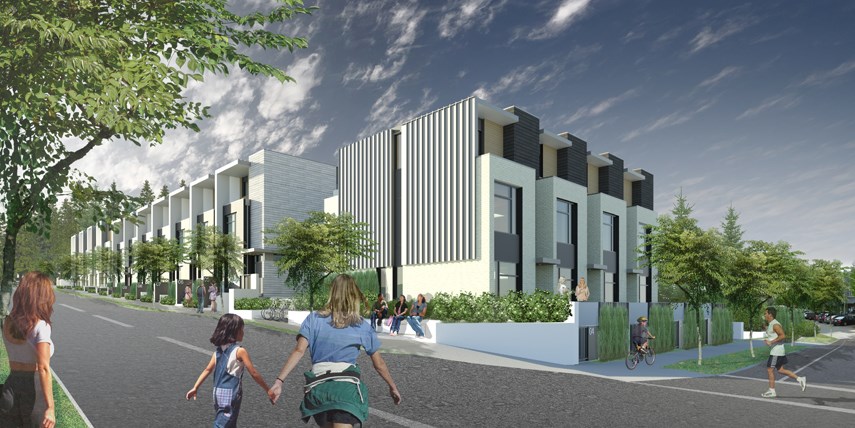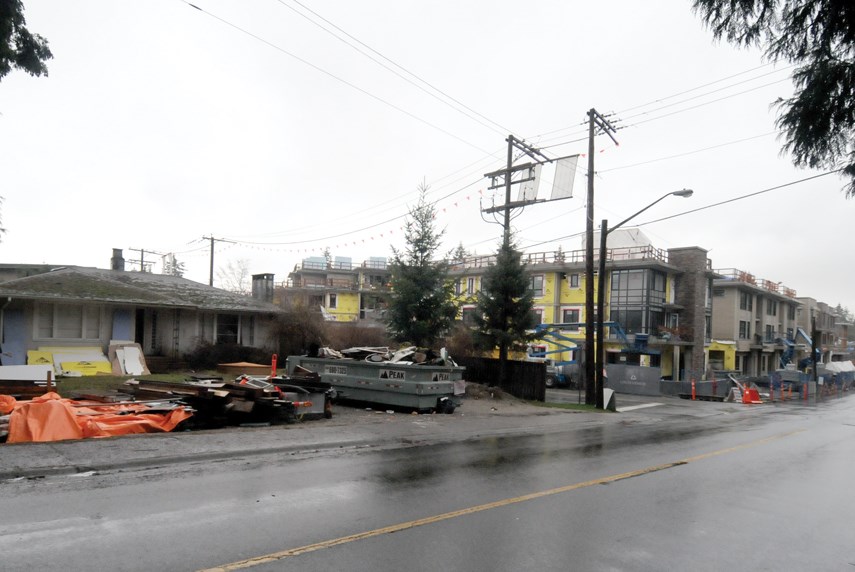District of North Vancouver council reversed their predecessors’ decision and rejected an Edgemont Village townhouse development, leaving the developer wondering if the municipality is closed for business.
The 1031-1045 Ridgewood Dr. project, which arrayed 25 three-bedroom units among five three-storey buildings, won approval from the previous council in July. But after suspending a rule that prohibits council from debating projects on the legislative brink of approval, a 5-2 majority scuttled the development at a Nov. 19 meeting.
“We really need to get more housing to the people who need it, not people who may downsize from $2-million houses,” Coun. Betty Forbes said, suggesting the $1.5-million asking price was too high for people in need.
Coun. Jordan Back urged council to approve Boffo Properties’ development.
“I do not believe that we should be taking a good development which has gone through the proper process . . . and at this late stage, hold it hostage,” he said.
Back and Forbes agreed Edgemont Village was suffering “construction fatigue,” but Back argued that weariness could be alleviated by delaying construction until neighbouring developments were granted occupancy permits.
Had the project been approved, construction would have begun by April 30, 2019, a delay that would have carried a significant cost, noted Boffo Properties principal Daniel Boffo.
Boffo said he was: “extremely frustrated and disappointed” with council’s decision to terminate what was intended to be “pretty much a mirror image” of Boffo’s other development on Ridgewood Drive, a collection of executive townhomes known as Edgemont Walk.
The approval process was lengthy and costly, Boffo said, noting the company’s extensive work with neighbourhood groups who largely supported the project.
A 2017 public hearing featured 14 speakers advocating the project and two opposing it. Other speakers outlined concerns related to simultaneous construction operations clogging the village.
For the developer, council’s rejection is a signal the district is “closed for business,” Boffo said.

Building large single-family homes on the four lots is an option, he said, albeit an option the company would pursue reluctantly.
“Why would we want to have four $4-million homes sitting on these properties? How does that help provide opportunities to age in place?” he asked. “The single-family home is not for everybody, and frankly neither is the townhouse, but it provides variety along the housing continuum.”
The largely unprecedented late-stage rejection has left the future of the properties unclear, Boffo said.
“We’re really looking for the district to provide some clarity. What are they looking for from us? There was no feedback within the meeting.”
Mayor Mike Little and Coun. Megan Curren declined to comment at the meeting — a decision that rankled Edgemont resident Adrian Chaster.
Chaster, who served as chairman of the Edgemont Village Planning Working Group in 2014, worried about the implications of council’s vote.
“It completely complies with the village plan,” he said. “It shouldn’t be killed. I could see it being delayed.”
Council’s vote may signal the village plan is “inoperative after only four years,” Chaster said.
The construction onslaught has hurt the bottom line for Edgemont merchants, Chaster said, suggesting revenues are down between 10 to 25 per cent at most establishments. However, there’s still solid support for new developments so long as construction periods are staggered, he added.
Discussing the project in July, Coun. Lisa Muri noted the only businesses able to easily weather Edgemont’s exorbitant rents are banks.
“I’m not sure if that’s where we want to go as a municipality,” she said, discussing the erosion of the vibrant community of mom and pop shops.
“I think the amount of development that’s been going up in the village is enough. . . . I think people are exhausted,” Muri said. “There needs to be a bit of a break and a pause.”
While the village may be suffering construction fatigue, other residents are suffering housing fatigue, responded Coun. Mathew Bond.
“We’re forcing people out of the community by taking a pause,” he said. “We’ve slow-walked ourselves into this housing crisis and into this transportation crisis.”
Townhouses – while not qualifying as affordable housing – could be an option for downsizing residents, Bond added.
“It would be a shame to see those people forced to make a decision to leave their community because of age or reductions in ability because there are no alternatives,” he said.
Coun. Jim Hanson offered a different assessment.
“Until that development fatigue is overcome and fortified by a reinvigorated sense of optimism around development; development which is matched by appropriate planning and transportation planning in particular, and until the community is ready to embrace development . . . I would not support this proposal,” Hanson said.
The project was supported by former mayor Richard Walton, who noted the owners of the four lots could build larger homes without the entanglement of a council hearing.
“These four homes could be razed and four very, very, very large homes could be built right literally next door to Edgemont Village . . . and they would be completely out of character.”
A new council has the legal authority to reverse course, noted Simon Fraser University political science Prof. Patrick Smith.
“I don’t know whether the townhouse issue in North Van was an election issue. If it wasn’t, the local council have less cover to change their minds, even if it’s a new council,” he said. “But that’s a political question, not a legal one.”
West Vancouver’s communications department reported “no recollection” of council rejecting a proposal at fourth reading.
Council’s decision has “created a climate of distrust,” according to a letter from the Urban Development Institute and the Greater Vancouver Home Builders’ Association decrying council’s decision.
“This climate could discourage investment in the community, including . . . for projects that council desires such as affordable housing and expanded transit,” the letter stated.



